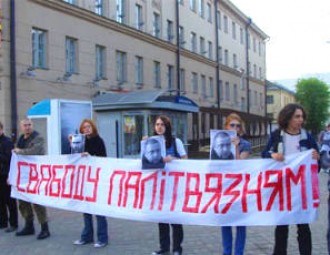New documentary about politically motivated abductions is released

On May 7, a documentary Banda was presented in Minsk dedicated to abductions of some politicians and the journalist Dzmitry Zavadski in 1999-2000.
The movie was created by the organization Belarusian Documentary Center (Vilnius, Lithuania). The idea of the movie belongs to the chair of the organization Raisa Mikhailouskaya. The presentation gathered around 30 people, among them journalists, human rights defenders, representatives of political parties.
Do we remember those abducted? “I think people forgot them long ago,” says Volha, mother of Dzmitry Zavadski. “Almost no one remembers them, except for several people involved in the cases. So, I would like to find response in hearts of the young. Young people must know what is going on in the country. I want them to think, analyze, stay open and to be a community.” She said she liked the movie although she did not agree with the version of her son’s abduction.
The case of Dzmitry Zavadski was the only politically motivated abduction that ended up with court proceedings. The case was heard in 2002. However, there was no body, no answer if he was murdered or alive, what the motive for the abduction was. The investigation came to a standstill. Meantime, some of those convicted under the case already completed their prison terms. “It looks like the investigation is going on, but we get no information about it,” says Volha Zavadskaya, mother of the abducted. She also reminded that on July 7, 2015 the case would be barred by the statute of limitations, according to the previous version of the Criminal Code of Belarus (the 15-year term expires).
The movie Banda (Gang) aims to store and systematize information about these resonating cases and to put forward it to younger audiences who might be not aware of the abductions. The music of the movie, a rap piece was composed by an 18-year-old musician.
The directors are Pavel Bandzich and Yauhen Shapchyts, scriptwriters Raisa Mikhailouskaya and Maryna Bialiatskaya. It took almost a year to systematize events, documents, to listen to witnesses of the cases and to make the movie. The movie includes talks with Aleh Alkayeu, Iryna Krasouskaya, Volha and Sviatlana Zavadskaya, Vasil Liavonau, Zinaida Hanchar, Mechyslau Hryb, Pavel Sharamet, Hans-Georg Wieck and others. The documentary lasts over 50 minutes and consists of 7 parts. Soon, the movie will be published on the website of the Belarusian Documentary Center.
On May 7, it turned 16 years since the abduction of Yury Zakharanka, former Minister of Home Affairs of Belarus. The aggrieved persons in the case are mother of the abducted Uliana Zakharanka and the wife Volha Zakharanka.
The case of Zakharanka should have been barred by the statute of limitations already year ago, said Aleh Volchak, head of the center Legal Aid to the Population (Kyiv, Ukraine). “However, the General prosecutor’s office and the Investigative Committee replied to our requests that the case was not closed and the investigation was going on.”
The human rights defender thinks that the officials extend investigation intentionally. As soon as the case is closed, the aggrieved persons and their lawyers will have a possibility to read the documents and check what has been done for these 16 years. It means publicizing the results of the investigation and a new informational wave. “Now, the topic of the abducted is inconvenient, and even dangerous for talks, for international meetings. Though, I think this is the main issue to raise right now. We must talk about it today, right now, before the presidential elections.”
Aleh Volchak called on everyone who knows something to speak up. “There are no ideal crimes,” he said. “A murder does not solve a problem, but only adds up to it. All facts, witnesses will come to surface by themselves, with time. When the authorities change, everyone involved in the events will talk, will testify. Nothing was forgotten, everything was registered.”
Let us recall that the politically motivated abductions are considered disappearances of Yury Zakharanka, former Minister of Home Affairs of Belarus, abducted 1999; Viktar Hanchar, Vice-Speaker of the Supreme Council of the 13 Convocation, abducted 1999; Anatol Krasouski, businessman, abducted 1999; Dzmitry Zavadski, journalist, cameraman of the 1st channel (Russia), abducted 2000.
-
03.01
-
07.10
-
22.09
-
17.08
-
12.08
-
30.09








































